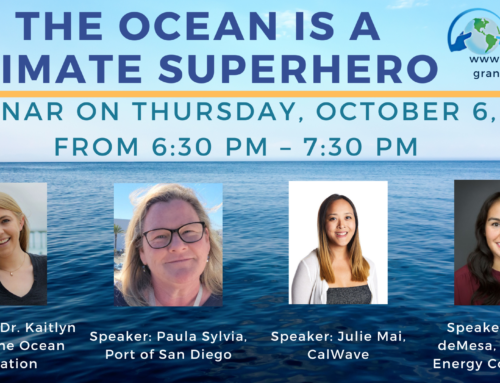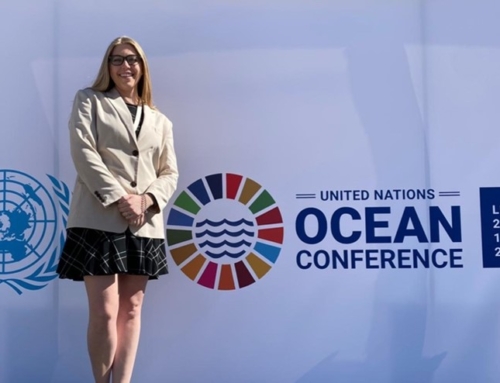Thank you to the 35 attendees who joined us on March 1 to hear from Dr. Lisa Levin. As a deep sea biologist, she spoke to us about her research on how climate change is affecting the ocean.

The ocean covers 70% of the earth’s surface with an average depth of 3,800 meters. The ocean holds most of the habitable volume on earth…and most is deep sea! About fifty years ago, researchers began to recognize that carbon emissions were altering the oceans.
The ocean is our planet’s most important climate mitigator. The ocean has absorbed more than 93% of the heat resulting from CO2 emissions. The ocean absorbs 26% of annual CO2 emissions.

This has created a deadly quartet of stressors on the ocean, says Levin. They are: global warming, sea level rise, declining oxygen levels and ocean acidification.
A warming ocean holds less oxygen – this is a major consequence of global warming. The ocean has lost 2% of its oxygen since 1960s, but not uniformly. Low oxygen areas are expanding, especially in the in the tropical and subtropical ocean areas.
We will continue to see large die-offs and food webs in decline. Fish distribution will be  smaller. Called “habitat depression,” fish get pushed into shallower water, making them more vulnerable.
smaller. Called “habitat depression,” fish get pushed into shallower water, making them more vulnerable.
The greatest threats to biodiversity will come from the intersection of climate change with direct human activities. Where pH declines are greatest is where corals are most common and bottom trawling is prevalent. As oceans take up CO2, pH goes down making the water more acidic and oceans loose carbonate ions. When pH declines  we see a loss of shellfish, corals and other pteropods, the basis of the food web.
we see a loss of shellfish, corals and other pteropods, the basis of the food web.
So, what can we do about it? Dr. Levin offers five main take-aways:
- Embrace the ocean as a major climate mitigator – keep it healthy
- Manage for multiple stressors with an ecosystem-based approach
- Accelerate ocean observations
- Raise ocean literacy globally
- Engage the next generation
At our meeting, we also heard from Kids 4 Planet Earth.

They have a goal to send 1 million letters and postcards to the White House from children across the nation to highlight the importance of addressing climate change. Here’s how you can help:
1. Have kids you know write letters to President Trump
2. Send the letters or postcards before Earth Day (April 22, 2017)
3. Register: kids4planetearth.org
4. Take a picture of the letter and post on social media
5. Spread the word: share this campaign with your church group, a mom’s and kids’ group, a teacher or school group!
Read more about this ambitious project here.



